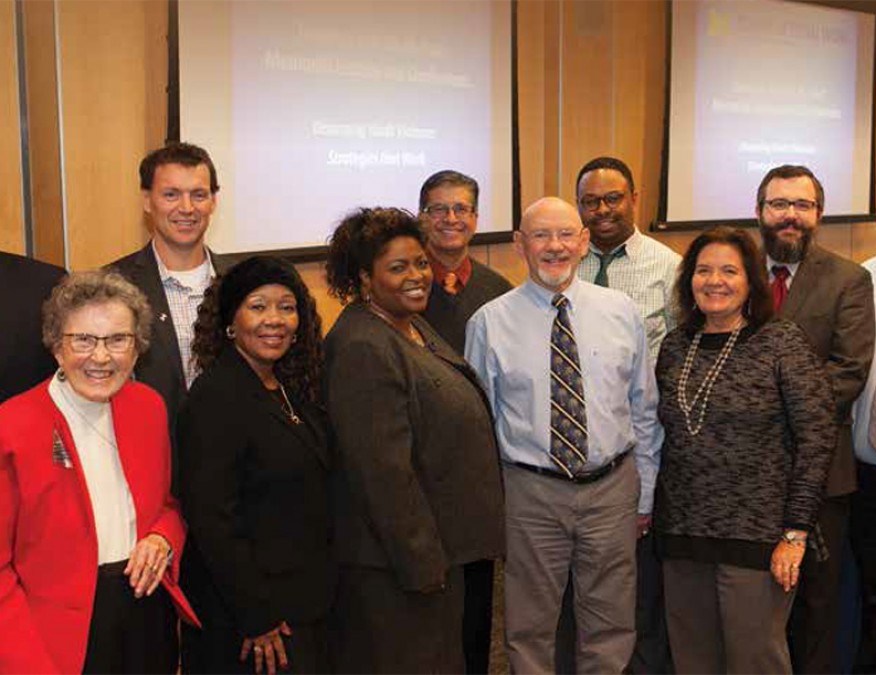The 2014 Fedele F. Fauri and Iris M. Fauri Memorial Conference “Disarming Youth Violence: Strategies that Work” was held November 19, to address the pressing social dilemma of youth violence.
The Fauri Memorial Conference is held annually to acknowledge former University of Michigan School of Social Work Dean and Vice President Fauri’s leadership and accomplishments in the field of child welfare. This year’s conference presented the work of professors, community activists and political leaders. Young people from Detroit also spoke about the complexities of youth violence in the country.
Keynote speakers James Garbarino, PhD, (the Maude C. Clarke Chair in Humanistic Psychology and founding Director of the Center for the Human Rights of Children at Loyola University Chicago) and Andrew Papachristos, PhD (Associate Professor of Sociology, Public Health, and Law (adjunct) at Yale University) highlighted important perspectives through their research on understanding the origins and risks associated with youth violence and trauma in the United States. While approaching the topic with vastly different methodological frameworks, they both made clear that their ultimate goal is to find solutions to this social dilemma on both an individual and a societal level.
Garbarino’s talk focused on the importance of an ecological understanding of violence and the multiple contributors to youth violence. He highlighted how violence and trauma impacts developmental trajectories and accompanying traumas of young offenders of violence. He identified these areas as primary mechanisms to engage in prevention, and to consider their relevance in treatment and recovery. Papachristos approached the issue from a macro-perspective, speaking to the application of network science to understand social networks, neighborhoods, and interpersonal and gang violence. His work focuses on violence reduction strategies, most notably evident in his involvement with the Project Safe Neighborhoods initiative and the Group Violence Reduction Strategy in Chicago.
U-M SSW Assistant Professor Desmond Patton, PhD, presented his qualitative research on the Digital Contagion of Youth Violence on Twitter, studying the widely known homicide of Gakirah Barnes, the alleged teenage queen of Chicago’s gangland, which he used to explore how and when gang-involved youth communicate aggression on Twitter. His findings illuminated the ways in which social media has become an important space for coping and expressing raw emotion by young people living in violent, urban neighborhoods, and therefore concludes that online interventions that target this population could be very beneficial. He indicated that the development of online interventions for youth is an important next line of research to explore.
In the afternoon, young members of Youth Power Movement led by Director Kayla Mason, MSW ’11, spoke about the reality of adolescence and youth violence in Detroit. These impressive young leaders spoke about the importance of peer mediation and restorative practices as mechanisms of change in adolescent relationships in schools. City of Detroit Council Member Raquel Castañeda-López, MSW ’07 followed this conversation with a discussion of the City’s Youth Development Task Force and the political paradigm shift to developing solutions to social problems.
The day ended with a panel on youth violence intervention approaches with Stacie Bowens, MSW ’00 (Wayne County Department of Human Services-Child and Family Services), Patrick Carter, MD (University of Michigan Injury Center) and Cheryl Myhand (Wish Ministries Inc.). Robert Ortega, MSW ’83, PhD ’91, Rosemary Sarri, PhD ’62, (Emerita), Shawna Lee, MSW ’01, PhD ’05, and Joseph Ryan, MSW ’96, PhD, University of Michigan School of Social Work faculty and members of the conference planning committee, facilitated lively conversations throughout the day between the presenters and the audience, paving the way for serious thought and critical perspectives in the School’s long-time commitment to child welfare and child well-being.
Written by Sara Stein
